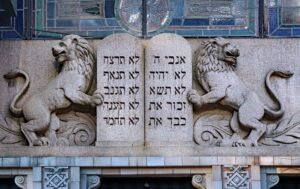What Would Religious Charter Schools Mean for Education Choice?
In St. Isidore of Seville Catholic Virtual School v. Drummond, the U.S. Supreme Court is poised to decide whether states that allow secular charter schools must also allow charter schools that are religious in their mission and curriculum. How would a decision in favor of St. Isidore of Seville, an upstart virtual Catholic school based in Oklahoma City, alter the school choice landscape? How would it impact the way reform advocates and the broader public view charter schools? And what would it mean for the private education sector?
To wrestle with these questions, Education Next welcomes two longtime champions of education choice. Nicole Stelle Garnett, the John P. Murphy Foundation Professor of Law at the University of Notre Dame, argues that the advent of religious charter schools would be a net positive for parental choice and religious freedom. Derrell Bradford, president of 50CAN, warns of unintended consequences or an erosion of the delineation between the charter and private school sectors.
In 2012, I wrote an essay called “Are Charters Enough Choice? School Choice and the Future of Catholic Schools.” At the time, charter schools were ascendant and growing exponentially, and private-school choice faced formidable political hurdles to expansion. I argued, and continue to believe, that charters are not enough choice. Instead, parental-choice advocates should embrace both charter schools and private-school choice for many reasons, including the fact that charter school laws universally prohibit religious charter schools.
Much has changed since 2012. Private-school choice is now ascendant and growing exponentially, and charter schools face formidable political hurdles to expansion. And a series of recent U.S. Supreme Court decisions call into question the constitutionality of laws banning religious charter schools. The court is currently considering that question in a case concerning what would be the nation’s first religious charter school, St. Isidore of Seville Catholic Virtual School. St. Isidore, a joint project of the two Roman Catholic dioceses in Oklahoma, wants to use charter school funds to make a high-quality, authentically Catholic education available to students across a large rural state, where many underserved communities lack access to options other than traditional public schools. But the Oklahoma Supreme Court ordered the Oklahoma Charter School Board to rescind its contract with St. Isidore because it is a Catholic school. The school argues that this exclusion amounts to unconstitutional religious discrimination.
Here, I focus not on the legal arguments in that case but on its policy consequences. Would a decision requiring Oklahoma to permit a religious charter school be a net positive for school choice? My answer—yes—flows from three principles: First, pluralism is good for parental choice. Second, religious freedom is good for parental choice. And third, the effects of a decision in favor of St. Isidore would be positive, but modest. It would advance religious freedom and expand options for families, but as a natural, incremental change to chartering, it would not fundamentally reshape the parental-choice landscape.




